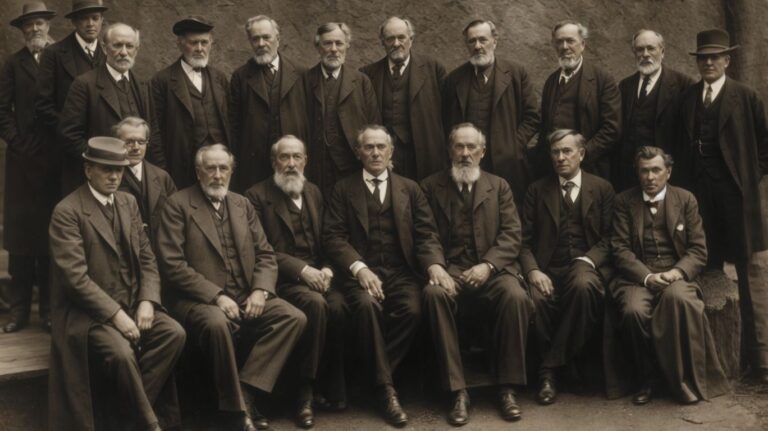Rene Descartes, a 17th-century French philosopher, mathematician, and scientist, made significant contributions to the field of psychology that continue to influence modern thought.
His ideas, such as mind-body dualism, the concept of innate ideas, and the role of the pineal gland, have had a lasting impact on the development of psychology, shaping various schools of thought and areas of study.
In this article, we will explore Descartes’ ideas and their influence on psychology, as well as examine some criticisms and the legacy he has left on the field.
Join us as we delve into the fascinating world of Descartes’ impact on psychology.
Contents
- 1 Key Takeaways:
- 2 Who Was Rene Descartes?
- 3 What Were Descartes’ Contributions to Psychology?
- 4 How Did Descartes’ Ideas Influence the Development of Psychology?
- 5 What Are Some Criticisms of Descartes’ Ideas?
- 6 How Has Descartes’ Legacy Shaped Modern Psychology?
- 7 Frequently Asked Questions
- 7.1 1. Who is Rene Descartes and what was his impact on the development of psychology?
- 7.2 2. What is Descartes’ theory of dualism and how did it influence psychology?
- 7.3 3. How did Descartes’ concept of “I think, therefore I am” contribute to the understanding of human consciousness?
- 7.4 4. What is Descartes’ view on the role of reason in understanding human behavior?
- 7.5 5. How did Descartes’ concept of innate ideas contribute to the nature vs. nurture debate?
- 7.6 6. How has Descartes’ influence on psychology evolved over time?
Key Takeaways:
- Descartes’ mind-body dualism theory sparked ongoing debates in psychology about the relationship between the mind and body.
- His concept of innate ideas influenced the study of developmental psychology and the role of genetics in behavior and cognition.
- Descartes’ focus on the pineal gland paved the way for future advancements in neuroscience and the understanding of the brain’s role in behavior and consciousness.
Who Was Rene Descartes?
René Descartes, a renowned French philosopher, made significant contributions to the field of philosophy through his influential Cartesian philosophy and extensive philosophical writings, as documented by scholars at Cambridge University Press.
Descartes, known as the ‘Father of Modern Philosophy’, is celebrated for his emphasis on reason and skepticism, giving rise to the famous phrase ‘Cogito, ergo sum’ (I think, therefore I am).
His groundbreaking treatise, Discourse on the Method, challenged traditional scholasticism, laying the foundation for rationalism. Descartes’ ‘Meditations on First Philosophy’ revolutionized understanding of the mind-body dualism and set the stage for subsequent philosophical inquiries into consciousness and existence. His enduring legacy continues to shape the discourse of Western philosophy.
What Were Descartes’ Contributions to Psychology?
René Descartes’ contributions to psychology encompass his groundbreaking exploration of mind-body dualism, which has left a lasting impression on historical perspectives and influenced modern behavioral psychology.
Descartes’ theories posited the existence of two distinct substances: the immaterial mind and the material body. He proposed that these two entities interacted through the pineal gland, revolutionizing understandings of the relationship between consciousness and the physical world.
His influential ideas continue to shape contemporary debates about the nature of mind and body, shedding light on mental health, consciousness, and the human experience.
Descartes’ teachings established a foundational framework for the study of cognitive psychology, paving the way for ongoing exploration of the complexities of human cognition and behavior.
Mind-Body Dualism
Descartes’ concept of mind-body dualism delves into the intricate relationship between the mind and body, addressing the complexities of consciousness and its implications for understanding functional brain disorders.
By positing that the mind and body are distinct entities, Descartes initiated a discourse that has endured through the ages. This theory holds relevance in the field of psychology, shedding light on the nature of human perception and subjective experience.
Its exploration of consciousness has provided invaluable insights into the complexities of mental processes and their impact on behavior and cognitive function.
Considered within the context of functional brain disorders, Descartes’ theory underscores the importance of understanding the interplay between mental and physiological states, offering potential avenues for addressing these disorders.
The Concept of Innate Ideas
Descartes’ exploration of innate ideas within psychology emphasizes a methodological approach rooted in a biological perspective, shaping the foundations of psychological inquiry and philosophical reasoning.
In his philosophical treatise, Descartes posited that the human mind possesses certain innate ideas that are ingrained from birth, independent of experience.
This concept underpinned his methodological approach to understanding the nature of knowledge and cognition.
From a biological perspective, Descartes proposed that these innate ideas emerge from the interaction between the mind and the body, highlighting the interconnectedness of psychological and physiological processes in shaping human understanding.
The Role of the Pineal Gland
Descartes’ exploration of the pineal gland’s role in consciousness relationships offers intriguing insights into neuroscience from a biological perspective, shaping contemporary discussions on brain functioning and consciousness.
Descartes, through his philosophical inquiries, sought to understand the intricate connections between the mind and body. He delved into the potential influence of the pineal gland on conscious experience, raising significant questions about the physical mechanisms underlying mental processes.
His musings on the unique position of the pineal gland as the only unpaired organ in the brain prompted further exploration by researchers in neuroscience. This historical perspective continues to shape contemporary discussions about the brain and the nature of consciousness.
How Did Descartes’ Ideas Influence the Development of Psychology?
Descartes’ ideas have wielded significant influence on the development of psychology, shaping diverse branches such as behaviorism, cognitive psychology, and neuroscience with their profound philosophical underpinnings.
Descartes’ dualistic theory of mind and body has been instrumental in the foundation of behaviorism. It initiated the exploration of observable behaviors and the exclusion of mental processes in the study of psychology.
His emphasis on rationalism and the role of innate ideas has deeply impacted cognitive psychology. It laid the groundwork for understanding mental processes, perception, and memory.
Descartes’ ideas on the brain and its functions have provided a philosophical basis for the integration of neuroscience with psychology. This has shaped the interdisciplinary field of cognitive neuroscience and influenced the study of the biological basis of behavior and mental processes.
Influence on Behaviorism
Descartes’ influence on behaviorism within psychology extends to the intricate study of consciousness relationships, paving the way for insightful explorations in psychosomatics and psychiatric disorders.
His philosophical views on the mind-body relationship have significantly impacted the field of psychology, particularly through the lens of behaviorism.
Descartes’ dualistic theory, differentiating between the mind and body, laid the groundwork for understanding mental processes and their influence on behavior.
His notion of the pineal gland as the seat of the soul and the portal between the physical and the mental has sparked debates and inquiries into the intricacies of consciousness, driving psychologists to delve deeper into the nature of human experience and the complexities of psychosomatic phenomena.
Descartes’ emphasis on rational introspection and the subjective nature of thought has resonated with modern research on psychiatric disorders, providing valuable insights into the mechanisms underlying conditions such as anxiety, depression, and psychosis.
Influence on Cognitive Psychology
Descartes’ influence on cognitive psychology permeates the exploration of consciousness and its implications for understanding functional brain disorders, contributing to advancements in neurology and psychiatric research.
His philosophical exploration of the mind-body relationship laid a foundational framework for contemporary investigations into cognitive functions and their dysfunctions.
The dualistic approach proposed by Descartes has prompted extensive debate and analysis within the context of neurology and psychiatry, shaping the perspectives on the interconnectedness of mental processes and brain function.
His emphasis on introspection and the nature of thought has significantly influenced research on the neural basis of consciousness, shedding light on the underlying mechanisms of cognitive impairments in various disorders.
Influence on Neuroscience
Descartes’ influence on neuroscience resonates in the study of brain functioning and consciousness, contributing to a methodological approach that underpins contemporary discussions within the field.
Descartes’ philosophical inquiries into the nature of the mind and body have had a lasting impact on the interdisciplinary study of neuroscience. His famous statement ‘Cogito, ergo sum’ (I think, therefore I am) is a testament to his exploration of the mind-body relationship.
One of Descartes’ most influential ideas is his dualistic framework, which separates the mind and body. This has sparked ongoing debates and investigations into the connection between mental processes and physical brain mechanisms.
Furthermore, Descartes’ belief in the existence of innate ideas has greatly influenced neuroscientific explorations into the conceptualization of knowledge and the understanding of the brain’s cognitive processes.
What Are Some Criticisms of Descartes’ Ideas?
Descartes’ ideas have faced criticisms for their perceived lack of empirical evidence, reductionist approach, and overlooking the influences of environmental factors, prompting insightful debates within the realm of psychology and philosophy.
One of the major criticisms of Descartes’ ideas is the skepticism associated with the lack of empirical evidence.
Critics argue that while his philosophical propositions are intriguing, they often lack substantial scientific validation, leading to concerns about their practical application in understanding human behavior and cognition.
Descartes’ reductionist approach has been met with skepticism, as it tends to oversimplify complex phenomena, potentially diminishing the depth of understanding in psychology and philosophy.
Critics emphasize the need for a more comprehensive framework that encompasses the nuanced interplay of various factors impacting human experience.
Lack of Empirical Evidence
Critics have highlighted Descartes’ ideas for their perceived lack of empirical evidence, sparking discussions within psychology and modern philosophy on the need for a robust scientific framework to support theoretical propositions.
Descartes’ emphasis on rationalism and the prioritization of introspection over empirical evidence has been a subject of critique, particularly in the context of psychology’s emergence as a scientific discipline.
While his method of doubt laid the foundation for skepticism, it also faced scrutiny for its limited ability to address phenomena that could only be understood through empirical observation and experimentation.
This criticism led to the development of empiricism, which emphasized the importance of sensory experience and observation in forming knowledge.
In modern philosophy, the debate on the role of empirical evidence continues, with Descartes’ critics advocating for a comprehensive scientific framework that integrates both rational and empirical approaches to advance theoretical understandings within psychology and beyond.
Reductionist Approach
The reductionist approach attributed to Descartes has been a subject of critique within psychology, stimulating debates on the intricate nature of consciousness relationships and the need for a balanced biological perspective in psychological inquiries.
In critiquing Descartes’ reductionist approach, psychologists have raised concerns about simplifying the complexities of human consciousness into purely mechanistic components.
This criticism has prompted discussions on the limitations of solely reducing mental phenomena to physical processes, highlighting the necessity of integrating a more holistic understanding that encompasses both biological and cognitive aspects of psychology.
Scholars argue that a narrow focus on reductionism may overlook the interplay of biological, psychological, and social factors, which are vital in understanding human behavior and mental processes.
It has led to a call for a balanced approach that acknowledges the multidimensional nature of consciousness and emphasizes the interconnectedness of biological and psychological systems.
Ignoring the Influence of Environment
Descartes’ ideas have been rebuked for overlooking the influence of environmental factors within psychology, fostering discussions on the significance of environmental influences and the development of methodological approaches within historical perspectives.
In the context of psychology, critics argue that Descartes’ emphasis on the mind-body dualism resulted in neglecting the impact of environmental factors on human cognition and behavior.
This criticism has sparked debates on the complex interplay between genetic predispositions and environmental stimuli, shaping the evolving paradigms in psychological research.
Recognition of environmental influences has led to innovative methodological approaches, promoting a holistic understanding of human psychology within historical frameworks. This acknowledgement enriches contemporary discussions on the intricate dynamics that shape human experiences.
How Has Descartes’ Legacy Shaped Modern Psychology?
Descartes’ legacy continues to wield a profound impact on modern psychology, fostering continued debates on mind-body dualism, applications of innate ideas in developmental psychology, and the study of the pineal gland in neuroscience.
The enduring influence of Descartes’ ideas is exemplified in the ongoing discourse surrounding the separation of the mind and body, which has significant ramifications for understanding mental health and consciousness.
The concept of innate ideas, as posited by Descartes, remains relevant in contemporary discussions on cognitive development and the origins of knowledge in developmental psychology.
Descartes’ focus on the pineal gland as the seat of the soul continues to inspire research in neuroscience, providing valuable insights into brain function and consciousness.
Continued Debate on Mind-Body Dualism
Descartes’ legacy has fueled ongoing debates on mind-body dualism within modern psychology, diving into the intricate dynamics of consciousness relationships and their relevance to psychiatric disorders and functional brain disorders.
The discourse surrounding mind-body dualism, deeply influenced by Descartes’ philosophical musings, has led to an intricate exploration of the interplay between consciousness and physical manifestations.
This ongoing debate is crucial within the realm of modern psychology, with scholars and researchers seeking to unravel the complexities of how the mind and body interact and intertwine in various states, thereby elucidating potential implications for psychiatric disorders and functional brain disorders.
Application of Innate Ideas in Developmental Psychology
Descartes’ legacy resonates in the application of innate ideas within developmental psychology, shaping methodological approaches that draw inspiration from the renowned Cartesian method of inquiry.
These methodological approaches, deeply rooted in Cartesian thought, emphasize the innate nature of certain cognitive structures and processes in human development.
Through a lens influenced by Descartes’ philosophy, developmental psychologists seek to unveil the innate knowledge that individuals possess from birth, thus diving into the complexities of human cognition and behavior.
In this context, the study of innate ideas in psychology incorporates the rigorous inquiry and skepticism inherent in the Cartesian method, fostering a critical and analytical lens towards understanding the development of fundamental cognitive capacities.
Study of the Pineal Gland in Neuroscience
Descartes’ legacy has sparked a dedicated study of the pineal gland within neuroscience, illuminating the role of consciousness and the biological perspective in shaping contemporary discussions on brain functioning and mental processes.
Recent research has delved into the intricate interactions of the pineal gland with various physiological and psychological phenomena. This small, pea-shaped gland, nestled deep within the brain, holds a significant place in the discourse surrounding human consciousness and cognition.
Emerging findings continue to unveil the pineal gland as a key regulator of circadian rhythms and the production of the hormone melatonin, thus inherently influencing sleep-wake cycles and potentially impacting cognitive functions.
Descartes’ conceptualization of the pineal gland as the “seat of the soul” has fostered ongoing investigations into its potential contributions to the intangible, yet profound, aspects of human experience.
Frequently Asked Questions
1. Who is Rene Descartes and what was his impact on the development of psychology?
Rene Descartes was a French philosopher, mathematician, and scientist who lived in the 17th century. He is known as the “Father of Modern Philosophy” and his ideas had a significant impact on the development of psychology. His belief in the separation of mind and body laid the foundation for the study of the mind and contributed to the emergence of modern psychology.
2. What is Descartes’ theory of dualism and how did it influence psychology?
Descartes’ theory of dualism proposes that the mind and body are separate entities, with the mind being immaterial and the body being material. This idea challenged the prevailing view at the time that the mind and body were interconnected. This theory of dualism had a major impact on the development of psychology, as it allowed for the study of the mind as a separate entity.
3. How did Descartes’ concept of “I think, therefore I am” contribute to the understanding of human consciousness?
Descartes’ famous statement “I think, therefore I am” emphasized the importance of self-awareness and consciousness. It suggested that the mind is aware of its own existence and can reflect on itself. This concept of self-awareness laid the groundwork for the study of consciousness in psychology, a topic that continues to be explored and debated to this day.
4. What is Descartes’ view on the role of reason in understanding human behavior?
Descartes believed that reason and rational thought were crucial for understanding human behavior. He argued that by using reason, humans could overcome their biases and emotions and arrive at true knowledge. This emphasis on rationality and critical thinking influenced the development of psychology, particularly in the areas of cognitive and behavioral psychology.
5. How did Descartes’ concept of innate ideas contribute to the nature vs. nurture debate?
Descartes proposed that certain ideas are innate, meaning they are present in the mind from birth, rather than being acquired through experience or learning. This idea sparked the nature vs. nurture debate in psychology, with some arguing that our thoughts and actions are shaped by our innate nature, while others believe that they are influenced by our environment.
6. How has Descartes’ influence on psychology evolved over time?
Since Descartes’ time, his ideas have been both praised and criticized by psychologists. While his theories of dualism and innate ideas have been largely rejected, his emphasis on rationality and critical thinking continues to influence the field of psychology. Additionally, his questioning of traditional beliefs and methods paved the way for new perspectives and approaches in psychology, making him a key figure in the history of the field.




